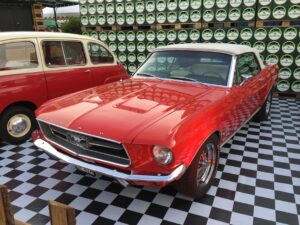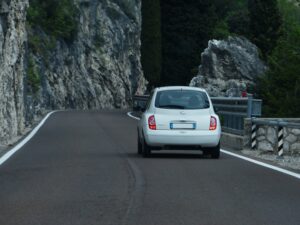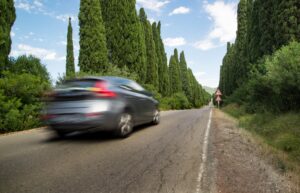
Learning how to increase car mileage is quite important these days, as it helps us spend money more reasonably while reducing the damage we cause to the environment. Hybrid or fully electric vehicles are helping out slightly, yet we all have to take measures if we want to live in a healthier world.
You can easily increase gas mileage by adjusting your driving habits. Small daily sacrifices will essentially result in big changes. And besides, why would anyone refuse to drive more with less fuel?
Today we’ll discuss how to increase mileage of petrol car, talk about electric and hybrid vehicles, and explore how to improve fuel efficiency depending on weather conditions.
How to increase mileage of petrol car?
If you’re wondering how to improve car mileage, you should know that you can reduce fuel consumption by modifying your driving habits. Here’s what you need to do:
Maintain a steady speed
Rapid and harsh braking, as well as sudden acceleration, can affect your fuel consumption significantly. According to Fueleconomy.gov, you can save up to $1.22 per gallon of gas if you maintain a steady speed.
Slow driving can improve your gas mileage as well. Studies show that your car starts drinking up more fuel as soon as you exceed 50-60 mph. Staying below that margin will help you save some money.
Plan your trips and combine them
Going on one long trip is always more efficient than taking several short trips every single day. Try to plan your trips and combine them whenever possible. That way, your car won’t have to waste all that fuel on warming up the engine each day.
Avoid idling
Idling can drain your fuel tank quite quickly. It’s better to turn off the engine even if you have to wait for someone. Don’t worry, you’ll need less fuel for starting your car than for idling.
Regulate tire pressure
Deflated tires can force you to spend extra 31 cents for each gallon of fuel. It’s easy to ignore tire pressure when it’s not really bothering you, yet it’s crucial to do the regular maintenance, especially if you want to learn how to improve mileage of petrol car.
Unload the vehicle
Carrying heavy cargo on the roof or driving with unnecessary baggage can result in extra expenses on fuel. The former increases the air resistance, while the latter makes the vehicle heavier. Both of them force your car to work harder (i.e. use more gas). Clean your car regularly and carry cargo in the trunk.
How to improve car mileage for electric, hybrid, and plug-in hybrid vehicles?

To improve mileage for electric, hybrid, and plug-in hybrid (PHEV) cars, you should follow the steps you’ll find below. Yes, these vehicles are more efficient, yet they could be improved if we paid more attention to our actions.
Get to know your car
The easiest way to improve the mpg or the MPGe (the equivalent for mpg in electric vehicles) is to read the owner’s manual. It contains information about various features that could essentially enhance fuel economy or increase the driving range.
Don’t forget about the economy mode
If you want to know how to increase your mpg, you shouldn’t forget about the economy mode. The majority of electric, plug-in hybrid, and hybrid vehicles have an in-built feature that limits performance to reduce fuel consumption and improve the range.
Make sure the battery is charged
This tip only applies to electric and plug-in hybrid vehicles. An electric car will cover more distance if its battery is fully charged. The PHEV won’t use as much fuel if it can get the power from the electricity. Therefore, keeping the batteries charged can help you out a lot.
Avoid rapid and harsh braking
Harsh braking affects the fuel economy of electric, PHEV, and hybrid cars as much as it affects petrol vehicles. It’s wiser to drive at steady speeds to avoid using harsh movements during braking.
Don’t get overboard with accessories
Not surprisingly, AC, seat warmers, and stereo can decrease the mpg or a driving range. If you want to save some money, it’s better to use those features only when necessary.
Why does fuel efficiency decrease in cold and hot weather?
Climate can affect the fuel consumption of your vehicle significantly as it determines how much power the engine will need to warm up and start. No matter how efficient your vehicle is on the whole – the chances are it will require more gas during winter and summer days.
However, the reasons for increased gas consumption differ in hot and cold weather. Let’s see how the climate affects the fuel economy.
The effects of cold weather on fuel economy
On average, the fuel economy decreases by 15% to 41% (depending on the type of the vehicle) in cold weather. Cold engine oil and fluids make it harder for the engine to heat up and reach its fuel-efficient state. As a result, it starts using more gas, especially if you take short trips.
Moreover, we tend to use seat heaters and cabin heating more frequently in winter. Battery performance and tire pressure decrease as well. The matters get even worse when the roads are snowy and icy. You have to drive your car slower without a proper grip on the tires.
All these factors create a situation where your car has to consume more fuel to operate properly.
The effects of hot weather on fuel economy
Before we learn how to increase car mileage in hot weather, let’s see why the sun decreases fuel efficiency.
Surprisingly, hot weather can actually reduce the amount of gas your vehicle consumes. It doesn’t require that much time to heat up, neither do you have to drag it in sense air.
However, as the weather gets hotter, we start using AC more frequently. It’s quite hard to withstand scorching heat and, thus, our car uses more fuel to power the AC.
We also tend to keep our windows down when we’re not using the air conditioning. Open windows increase the air resistance, making it hard for the car to move forward. As a result, we keep using more fuel and refilling the tank more frequently.
How to increase your mpg in cold and hot weather?

If you live in an area where the climate is extremely hot or cold, the following tips will help you learn how to increase car mileage.
Control the usage of heating and air conditioning
As we’ve already mentioned a couple of times, heating and air conditioning are the main culprits when it comes to decreased fuel efficiency.
During winter, try to turn on the heating and window defrosters only when it’s absolutely necessary. Don’t switch the heating just because you felt a slight chill.
During summer, roll your windows down for several minutes before you turn the AC. Activate the air conditioning at high speeds and keep your windows open when you’re driving slowly.
Don’t idle too long before driving
It’s a common misconception that idling warms up the engine. In winter, you only need to wait around 30 seconds before you start driving. The engine will warm up better if the car isn’t standing still.
In summer, you can start the engine even quicker. Make sure you don’t have the AC on if you have to idle. It’s better to avoid idling altogether, though.
Pre-heat/turn AC while charging your car
If you have an electric or a plug-in hybrid vehicle, turning on the AC or heat while charging is a better idea. By doing so, you’ll decrease/increase the temperature in the cabin initially. As a result, you won’t have to use that much battery power while driving.
Park your car in a cooler/warmer place
If you want to know how to increase mileage of petrol car, you should remember that you can combat hot/cold weather by parking the car in a cooler/warmer place. By controlling the temperature in the cabin and under the hood, you won’t have to crank the AC and heating to the fullest.
Final Takeaway
As you can see, it’s crucial to know how to improve car mileage no matter what type of vehicle you own. Be it a traditional petrol model, electric, hybrid, or a PHEV – you need to adjust your driving habits to improve the fuel efficiency or the driving range.
Using additional features, such as the AC and heating, wisely will save you a lot of money down the road.
Being mindful of how much petrol and power we consume isn’t difficult – we simply have to reduce our comfort slightly.
Sources: https://fueleconomy.gov/feg/driveHabits.jsp










